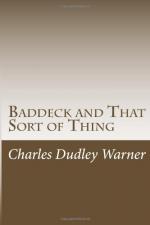This mercurial old gentleman only appears in these records because he was the only person we saw in this Province who was in a hurry to do anything, or to go anywhere.
We cannot leave Halifax without remarking that it is a city of great private virtue, and that its banks are sound. The appearance of its paper-money is not, however, inviting. We of the United States lead the world in beautiful paper-money; and when I exchanged my crisp, handsome greenbacks for the dirty, flimsy, ill-executed notes of the Dominion, at a dead loss of value, I could not be reconciled to the transaction. I sarcastically called the stuff I received “Confederate money;” but probably no one was wounded by the severity; for perhaps no one knew what a resemblance in badness there is between the “Confederate” notes of our civil war and the notes of the Dominion; and, besides, the Confederacy was too popular in the Provinces for the name to be a reproach to them. I wish I had thought of something more insulting to say.
By noon on Friday we came to New Glasgow, having passed through a country where wealth is to be won by hard digging if it is won at all; through Truro, at the head of the Cobequid Bay, a place exhibiting more thrift than any we have seen. A pleasant enough country, on the whole, is this which the road runs through up the Salmon and down the East River. New Glasgow is not many miles from Pictou, on the great Cumberland Strait; the inhabitants build vessels, and strangers drive out from here to see the neighboring coal mines. Here we were to dine and take the stage for a ride of eighty miles to the Gut of Canso.
The hotel at New Glasgow we can commend as one of the most unwholesome in the Province; but it is unnecessary to emphasize its condition, for if the traveler is in search of dirty hotels, he will scarcely go amiss anywhere in these regions. There seems to be a fashion in diet which endures. The early travelers as well as the later in these Atlantic provinces all note the prevalence of dry, limp toast and green tea; they are the staples of all the meals; though authorities differ in regard to the third element for discouraging hunger: it is sometimes boiled salt-fish and sometimes it is ham. Toast was probably an inspiration of the first woman of this part of the New World, who served it hot; but it has become now a tradition blindly followed, without regard to temperature; and the custom speaks volumes for the non-inventiveness of woman. At the inn in New Glasgow those who choose dine in their shirt-sleeves, and those skilled in the ways of this table get all they want in seven minutes. A man who understands the use of edged tools can get along twice as fast with a knife and fork as he can with a fork alone.
But the stage is at the door; the coach and four horses answer the advertisement of being “second to none on the continent.” We mount to the seat with the driver. The sun is bright; the wind is in the southwest; the leaders are impatient to go; the start for the long ride is propitious.




